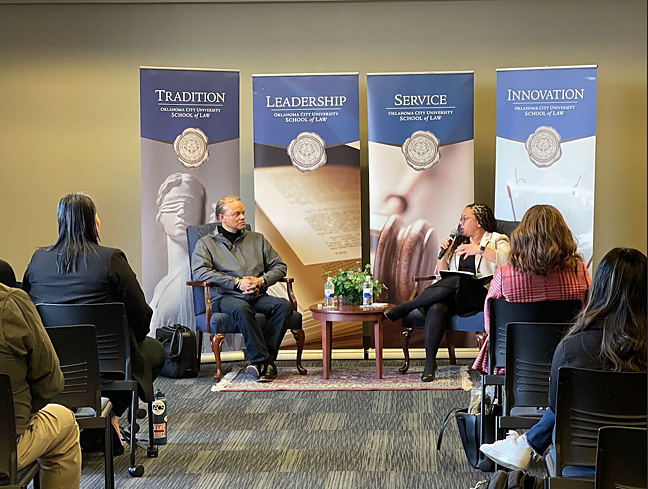
The OCU School of Law and Office of Diversity, Equity, and Inclusion hosted a lecture titled “Greenwood Oklahoma’s reckoning with the Tulsa Race Massacre.” The event is part of the Story the Road series. The event featured Hannibal Johnson and was moderated by Dr. Talia Carroll, Vice President for Diversity and Inclusion at OCU.
Johnson works for the 400 Years of African American History Commission and is the Committee Chair for the 1921 Tulsa Race Massacre Centennial Commission. Johnson has authored many books on the Tulsa Race Massacre. He was inducted into the Tulsa and Oklahoma halls of fame in 2021.
“In all, as many as 300 Black Americans were killed, and nearly 10,000 were left destitute and homeless,” states a presidential action from the White House.
Dr. Carroll said she had not learned about the Tulsa Race Massacre until later in life and this made her feel guilty. She encouraged the audience to step out of their comfort zone by admitting that they had not learned of these events until they were adults.
Johnson said that before the Tulsa Race Massacre, corporations were plotting schemes to relocate the Black population so that they could repurpose the land. He explained that the idea a Black district could be filled with millionaires was unsettling for the white population. “Imagine a world in which white supremacy is the prevailing ideology, it is accepted by majority, certainly the dominant culture. Black people are inferior if not sub-human,” Johnson said.
He said that Tulsa had embraced the Ku Klux Klan and that it had permeated to all levels of society. “There were doctors, lawyers, preachers, and teachers. Tulsa had one of the first women’s auxiliaries and youth chapters of the Klan.”
“Lynching is a form of domestic terrorism. The point of a lynching, which often involves the mutilation or murder of a Black person or a few Black people, the point really was not that violence against that person or that group. The point was the message that it sent to the larger group of the Black population. It is a reinforcement tool for white supremacy. The message was Black folks, you need to know your place, if you step outside your place this is what you might expect,” Johnson said.
He said that media institutions in Tulsa were actively instigating hate against the Black community. He said that the Tulsa Tribune published a series of articles and editorials that enraged the white community against the Black community.
Johnson said that referring to the events that unfolded in Tulsa as riots had been detrimental to the African American community within Tulsa. He says insurance companies refused to pay because of exclusion clauses on riots. “Other terms are equally if not more applicable.” Some of the applicable terms he shared were massacre, holocaust, ethnic cleansing, genocide, white riot, and assault. Johnson’s personal word of choice is massacre. He believes that everyone needs to research the event and these terms and come to their own conclusion on what they believe this event was.
“Cash reparation is one thing, but there are many other things like educational reform.”
He said that fixating on cash reparations stops the conversation. He said reparations broadly speaking include educational reform and economic incentives. He said cash reparations are unlikely and not feasible. He referenced a criminal case brought forward by survivors which was thrown out ultimately because of the statute of limitations. “If they had brought the claim back in 1921, It would have been to no avail. They had no chance of success back then.” He said, if the statute of limitations was disregarded, it would set precedents for victims of violence across the nation to bring claims forward.
Instead of focusing on the courts, Johnson believes claimants should target the legislature. He said overall the response from officials regarding revising the educational system has been supportive. However, he says recent legislation which limits speech on certain topics may undermine this progress. “You cannot talk about what happened in Tulsa 1921 in any substantive way without talking about white supremacy, without making people feel uncomfortable.”
Johnson said that it is imperative that we teach future generations about these past events so that history is not repeated. “If we all recognized the shared humanity of others, we would not be having a problem in Ukraine, right? Slavery would not have existed, we would not have had the civil war, the Holocaust would not have happened,” Johnson said.
He said when we see people as sub-human, harming people does not cause us distress. “If for no other reason, teaching these examples of what can go wrong when we do not respect and value each other is reason enough to teach it,” Johnson said.


Leave a Reply